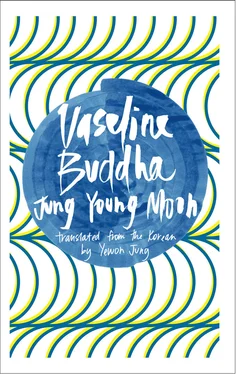And I thought of someone I saw on television who lived a life similar to that of the ocean ship sailor, gathering huge mushrooms growing on trees in a birch forest in Alaska, and someone else who lived in Greenland, catching birds with a little net. These people, immigrants who left their homelands long ago, lived like people with some big secrets — but it was possible that they didn’t have any secrets — like people who cultivated some big secrets. In any case, they seemed to me to be enjoying some kind of a secret pleasure, and in a way seemed to take after Wittgenstein. (At the time, I was very slowly reading a book on Wittgenstein, which was as difficult to understand as books written by Wittgenstein.)
I imagined creating a self-contained world of my own in which communication was impossible and unnecessary. Perhaps the very thing that constitutes a person’s inherent nature is something that can’t be understood by others. Only the thoughts that I couldn’t share in their entirety with another person seemed to be my genuine thoughts. I thought that the emphasis on communication, rampant among people and even forced upon them, was so excessive that, in a way, it kept a man from squarely facing the fact that he was, in the end, alone — how right are the words of Nietzsche, who said that a man merely experiences his own self, that he experiences a world distorted by his own self? — and made severance and isolation, things that were actually necessary, seem undesirable, and thought about how unstable and imperfect communication itself was, whose possibility may be nothing more than an illusion, and thought that you could go down deeper and withdraw into yourself, finding peace there, and that perhaps Wittgenstein, too, who stayed withdrawn deep in his own world, working as an assistant gardener, was able to communicate with the world on a different level, through the isolation he brought on himself.
Wittgenstein, who studied mechanical engineering and mathematics, then logic and philosophy and music, and fought in the First World War, and wrote, while at prison camp, Tractatus Logico-Philosophicus , which later became widely known, and also worked as an assistant gardener at a monastery where he lived as a recluse, probably spent a period of his life quietly bending and unbending his body in the silence of the monastery, cutting branches from trees, gathering fallen leaves, and fertilizing trees.
I imagined that perhaps it was while he was gardening or when he woke up from a brief nap while working in the garden — at which moment he may have recalled the war he had fought in, during which he may have escaped several deaths, and reflected on how far he had come from the war, and at the same time, how close the war was in his memory — that Wittgenstein, who fought in the last war in which romantic elements still loomed in the air despite the smoke of gunpowder and the smell of blood, a war in which horses were still used as an important mode of transportation, and soldiers in confrontation shared the food they made with each other, and people may have begun a new day’s fight by asking how each other’s night was, and whose two nephews fought each other as enemies in the next world war, came up with his important ideas.
It’s pleasant to think that Wittgenstein, two of whose older brothers committed suicide and one either committed suicide or disappeared, and who acquired a patent by doing a research that led to the development of the helicopter about thirty years later, and went to a small town in Norway in order to study logic without any disturbance, and studied the problem of color and the problem of certainty, and died two days after writing the last part of his book, On Certainty, and then, losing consciousness, thought about the air mechanics and parts of a helicopter while doing garden work, such as cutting tree branches and sweeping dead leaves, although I don’t know if he did so in reality.
When I was lost in my own thoughts, the cat that kept me at a distance would come near me, but when I tried to come near it, it would withdraw, and I would inflict several forms of torture, which were possible only in thought, upon the cat that was hiding somewhere or passing quietly in front of me, and picturing the cat in agony and passing out in the end, I would say something that was appropriate for saying to a cat in such a state, for instance, What we can say to a cat incessantly scratching its face is that wherever we go, we float down with empty chairs, surrounded by words.
And I named the cat, which had a name given by its owner, Maoist, although I didn’t call it by the name. I named it Maoist because one day while I was with the cat, I saw on television the news that Maoists had come into power in Nepal. I watched the news with Maoist the cat, which knew nothing at all about communism, which, without any grounds, made the cat seem like a true communist to me.
And thinking about Maoists’ Nepal, I tried to become better friends with the cat I named Maoist, but we never grew closer than when we first met. Maoist the cat, which had no thoughts of its own, looked like a Maoist when it was wandering around the house or sitting quietly somewhere, but when it was pooping in its sand-filled toilet, it seemed to go back to being an ordinary cat. Nevertheless, I told Maoist the cat about a cat named Tango that I saw on television one day, that left home and somehow appeared in the back of the stage for a British talk show that was being broadcast live, but I didn’t tell the cat about the fact that Mao Zedong mostly rode a rickshaw during the Long March, which was 9,000 kilometers long, or the fact that Yasser Arafat, the Palestinian leader, spent a lot of time raptly watching the cartoon “Tom and Jerry,” although he didn’t read a single book in the forty years before he died (I suddenly wondered which character Arafat identified with, and which he sided with as he watched “Tom and Jerry,” and if he didn’t come up with a strategy that would be helpful in fighting those he saw as his enemies while watching the cartoon, but I had no way of finding out). And I wondered whether or not it was right to tell Maoist the cat that in a certain area of the world at a certain period of time, there was a custom of burying cats alive in a wall in the house, but in the end, I did.
One day, Maoist the cat was walking on the keys of the piano whose lid I kept open, and it went carefully back and forth several times on the keys, even though it was quite startled and a little frightened by the sound that came when the keys were pressed, as if the sound raised its curiosity and brought it some kind of a pleasure, and did so several more times after that. I came to enjoy listening to the music played by Maoist the cat, a musician now, and I gave titles to the music it performed ad lib, differently each time, such as “Blue Rapture,” “Crumbling Sorrow,” or “Uncontrollable Dizziness.”
And as I watched the cat, the cat I had long ago came to my mind. The cat, which I named Ramsay — was it because there was a genius mathematician by a similar name, or was it because of the name of the characters in To the Lighthouse ? — loved it when I picked it up and threw it very high, and sometimes I threw it so high inside the house that it hit the ceiling with its head, but the cat loved it, as if it enjoyed being dizzy from hitting its head.
And sitting in a chair feeling dizzy, I thought about my dizziness, and thought that dizziness, like boredom, could be a condition of existence. And for the first time, I thought that perhaps I could examine the cause for my dizziness, and that the reason why I had never thought that there could be a cause for my dizziness, that I could find out the cause, was because the dizziness, which became obvious with my swooning, came to me so naturally, and so secretly at first, and became a natural part of me.
Читать дальше












